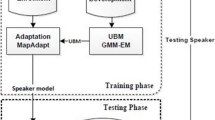Abstract
The paper examines issues related to proper selection of models used for quick speaker recognition based on short recordings of mobile telephone conversations. A knowledge of the encoder type used during the transmission of speech allows to apply an appropriate model that takes specific characteristics of the encoder into account: full rate (FR), half rate (HR), enhanced full rate (EFR) and adaptive multi-rate (AMR). We analyse both proper model selection and automatic silence removal. Analysis of time of processing is also a part of this study.
Access this chapter
Tax calculation will be finalised at checkout
Purchases are for personal use only
Preview
Unable to display preview. Download preview PDF.
Similar content being viewed by others
References
Bonastre, J.F., Wils, F., Meignier, S.: Alize, a free toolkit for speaker recognition. In: Proceedings of the IEEE International Conference on Acoustics, Speech, and Signal Processing (ICASSP 2005), vol. 1, pp. 737–740 (March 2005)
Dabrowski, A., Drgas, S., Marciniak, T.: Detection of gsm speech coding for telephone call classification and automatic speaker recognition. In: International Conference on Signals and Electronic Systems, ICSES 2008, September 14-17, pp. 415–418 (2008)
Dabrowski, A., Marciniak, T., Krzykowska, A., Weychan, R.: Influence of silence removal on speaker recognition based on short polish sequences. In: Proc. of Signal Processing SPA, September 29-30, pp. 159–163 (2011)
Debyeche, M., Krobba, A., Amrouche, A.: Effect of gsm speech coding on the performance of speaker recognition system, pp. 137–140 (2010)
Dunn, R.B., Quatieri, T.F., Reynolds, D.A., Campbell, J.P.: Speaker recognition from coded speech in matched and mismatched conditions. In: A Speaker Odyssey-The Speaker Recognition Workshop (2001)
Garofolo, J.S., et al.: Timit acoustic-phonetic continuous speech corpus. Linguistic Data Consortium, Philadelphia (1993), http://catalog.ldc.upenn.edu/LDC93S1
Grassi, S., Besacier, L., Dufaux, A., Ansorge, M., Pellandini, F.: Influence of gsm speech coding on the performance of text-independent speaker recognition. In: Proc. of European Signal Processing Conference (EUSIPCO), September 4-8, pp. 437–440 (2000)
Krzykowska, A., Marciniak, T., Weychan, R., Dabrowski, A.: Influence of gsm coding on speaker recognition using short polish sequences. In: Proc. of Signal Processing SPA 2012, pp. 197–202 (2012)
Lilly, B., Paliwal, K.: Effect of speech coders on speech recognition performance. In: Proceedings of the Fourth International Conference on Spoken Language, ICSLP 1996, October 3-6, vol. 4, pp. 2344–2347 (1996)
Reynolds, D.: Robust text-independent speaker identification using gaussian mixture speaker models. IEEE Trans. Speech Audio Proc. 3(1), 72–83 (1995)
Sharma, D., Naylor, P., Gaubitch, N., Brookes, M.: Non intrusive codec identification algorithm. In: 2012 IEEE International Conference on Acoustics, Speech and Signal Processing (ICASSP), pp. 4477–4480 (2012), doi:10.1109/ICASSP.2012.6288914
Vuppala, A.K., Sreenivasa Rao, K., Chakrabarti, S.: Effect of speech coding on speaker identification. In: 2010 Annual IEEE India Conference (INDICON), pp. 1–4 (2010)
Vuppala, A., Sreenivasa Rao, K., Chakrabarti, S.: Effect of speech coding on speaker identification. In: Annual IEEE India Conference (INDICON), pp. 1–4 (2010)
Author information
Authors and Affiliations
Editor information
Editors and Affiliations
Rights and permissions
Copyright information
© 2014 Springer International Publishing Switzerland
About this paper
Cite this paper
Weychan, R., Stankiewicz, A., Marciniak, T., Dabrowski, A. (2014). Improving of Speaker Identification from Mobile Telephone Calls. In: Dziech, A., Czyżewski, A. (eds) Multimedia Communications, Services and Security. MCSS 2014. Communications in Computer and Information Science, vol 429. Springer, Cham. https://doi.org/10.1007/978-3-319-07569-3_21
Download citation
DOI: https://doi.org/10.1007/978-3-319-07569-3_21
Publisher Name: Springer, Cham
Print ISBN: 978-3-319-07568-6
Online ISBN: 978-3-319-07569-3
eBook Packages: Computer ScienceComputer Science (R0)




